
Floodlight uses stories and data to advance community change
The following, about Knight Community Information Challenge project Floodlight, is written by Rebecca Arno, VP/communications for the Denver Foundation. This year’s challenge is accepting applications from community and place-based foundations through July 1. Photo credit: Floodlight.
This time of year in Denver, gardeners know that deep freezes and spring snow are behind us and it’s finally safe to plant. It’s also when the residents of the Whittier neighborhood will begin putting in their community garden – on a site formerly used by gangs to hide drugs and guns. They’ll need to recruit volunteers, but that shouldn’t be a problem, because they’ve already started telling their story and connecting their neighbors to the vision, through a new tool called Floodlight.
Floodlight is a partnership of The Piton Foundation, a private operating foundation created by energy entrepreneur and philanthropist Sam Gary, and The Denver Foundation, the oldest and largest community foundation in the Rockies, with generous support through the Knight Community Information Challenge. Both Piton and The Denver Foundation have longstanding commitments to helping people in low-income communities make change by using the power of data and storytelling.
Floodlight provides an easy-to-use, intuitive set of story-building tools to help users create a visually rich, shareable story that is tagged by subject and geography. The tool can embed video, audio, photos and data visualizations easily with text. The design team, using the flexible Django open source platform, used research about effective storytelling to put together templates that walk users through the complex process of crafting a compelling story.
The site also contains numerous skill-building tools to help storytellers up their game. They can learn from Denver writer Patricia Dubrava about the elements of an effective story (structure, detail, authenticity, and emotion), walk through a guide on data and visualizations, and discover how sound can bring an online story to life.
Since launch last fall, hundreds of Metro Denver residents, nonprofit staff, and community leaders have posted stories on Floodlight. We’ve found that “story-raisings” – community events similar to the old-fashioned notion of barn-raisings – are particularly effective in sharing the power of story to change communities. At these events, we’ve had experts on all aspects of storytelling – from using census data to drive a story’s point home, to using a mobile phone to effectively capture video. New storytellers, set loose to share the magic happening in their communities, are telling stories about painting over graffiti, building new parks, making kids safer, and doing yoga in public spaces.
What’s next? We’re continuing to build the reach of Floodlight, and to capture results. As envisioned, we’re linking Floodlight to the newly-launched Colorado Data Engine, another Knight-funded project that puts powerful data in the hands of community leaders who need it to make change. Both of the partner foundations are also working to incorporate Floodlight and data-driven storytelling into their grantmaking and reporting processes. The other big hill to climb is that we want community members to understand and access the power of data in supporting their stories; we’ve learned that many people can learn to tell a good qualitative story, but have more of a challenge backing that up with data and factual information. Nonprofit organizations in particular can benefit and grow capacity when they learn how to connect stories with the power of data.
By Rebecca Arno, VP/communications for the Denver Foundation and chair of the board of the Communications Network.
Recent Content
-
Community Impactarticle ·
-
Community Impactarticle ·
-
Community Impactarticle ·


